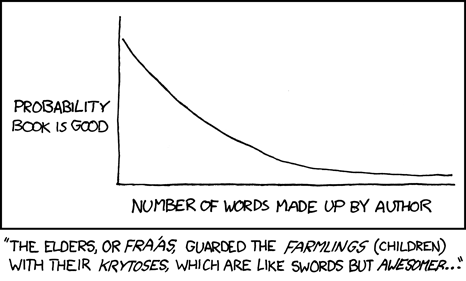The Nehor wrote:Actually in the books the undead army doesn't even go to the climactic battle. They frighten off the Corsairs so Aragorn can lead the group the Corsairs were attacking to Minas Tirith. You can blame that flaw on Peter Jackson but not Tolkien.
Good catch. It's been too long since I read the books.
I do remember having other plot issues with the books. They were sort of long and tendentious, for one thing. The undead subplot struck me as a bizarre curveball from left field whether Tolkien used it as a cop-out or not. Tom Bombadil was the same way. I will always hate Tom Bombadil, despite his many apologists.
The Hobbit was by far the best of the series.
That's part of the charm of the book.
For naïve people, maybe. :P Actually, one of the things I find most disturbing about this aspect of Tolkien's book is that so many people take it so seriously. They think that Tolkien's portrayal of a cosmic war between clear-cut Good and Evil is in some sense a true portrayal of the way things really are. And they are just as willing as Tolkien to depict those they disagree with as Evil and Hideous to the core.
What George R. R. Martin's characterizations capture that I think is so powerful is that deep down, nearly everyone thinks they're a good guy. Not only do evildoers refrain from wearing black hats, but in fact "evil" itself is something that's defined differently by different people depending upon their experience. Furthermore, moral choices usually involve tradeoffs between various perceived goods and evils. It's often difficult to know what is the best choice, when you don't know exactly what the consequences will be. Yet people will sometimes fight to the death over these kinds of ambiguous questions, taking their favored option to be an absolute Good.
Tolkien's and Martin's novels are both morality plays, but they're different kinds of morality plays. Tolkien's goal is to inculcate a few clear-cut virtues, such as heroism and selflessness. Martin's goal is to provoke critical reflection about what really constitutes the Good, and how best to pursue it. Both goals are all well and good, I suppose, but in my opinion they can't be allowed to cancel each other out. They have to be held in tension. My problem with Tolkien's approach is that it brutally sacrifices critical moral reflection on the altar of moral exhortation.
I don't think it was naïve. It was a choice the author took to focus on other things. The temptation the Ring represents (power) is the primary moral conflict. The temptation of Bilbo, Frodo, Sam, Boromir, Denethor, Faramir, Gandalf, Saruman, Gollum, Elrond, Aragorn, and Galadriel provides the 'gray' areas. Boromir, Denethor, and Saruman fall from it. Frodo fails in his mission at the end while Sam was able to willingly surrender the Ring.
None of those moral struggles are truly "gray" in the sense I'm talking about.
Peace,
-Chris

